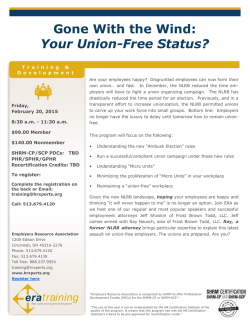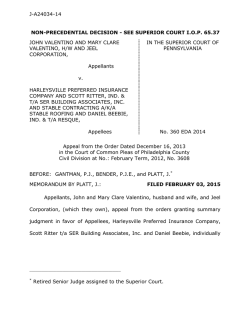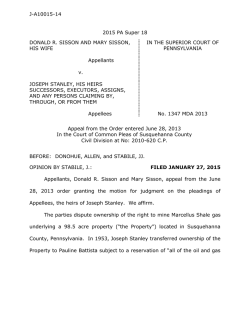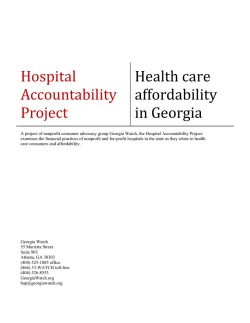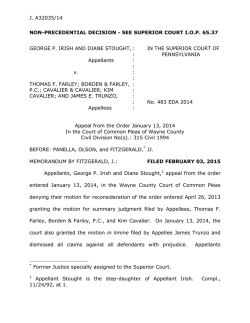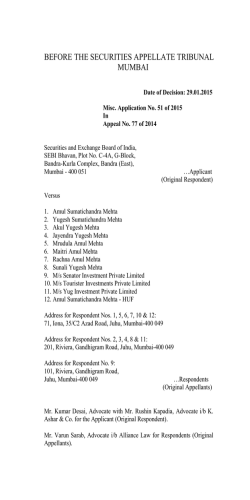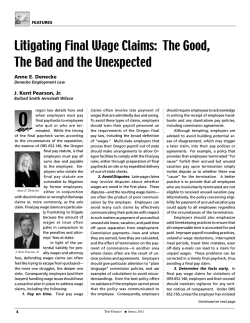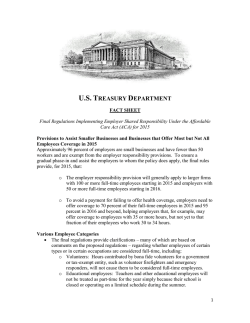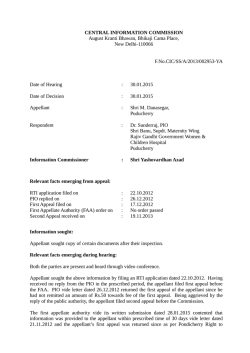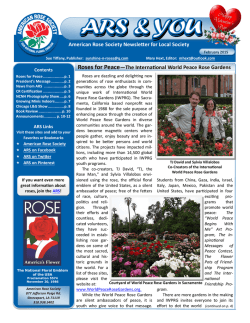
5291 - Rose v. JJS Trucking - South Carolina Judicial Department
THE STATE OF SOUTH CAROLINA In The Court of Appeals Samuel A. Rose, Claimant, Respondent,
v. JJS Trucking, LLC, Chris Thompson Services, LLC, Bridgefield Casualty Ins. Co., and South Carolina
Uninsured Employers' Fund, Defendants,
Of whom Chris Thompson Services, LLC and
Bridgefield Casualty Ins. Co. are Appellants,
and
JJS Trucking, LLC and South Carolina Uninsured
Employers' Fund are Respondents.
Appellate Case No. 2013-001322
Appeal From The Workers' Compensation Commission
Opinion No. 5291 Submitted November 1, 2014 – Filed January 28, 2015 APPEAL DISMISSED Kirsten Leslie Barr, Trask & Howell, LLC, of Mt.
Pleasant, for Appellants.
Joseph Brooks Fisher, George Sink, PA Injury Lawyers,
of North Charleston, and Benjamin William Akery, The
Steinberg Law Firm, LLP, of Goose Creek,
for Respondent Samuel A. Rose; John Eric Kaufmann, of
Columbia, for Respondent JJS Trucking, LLC; and Amy
V. Cofield, Cofield Law Firm, of Lexington, for
Respondent South Carolina Uninsured Employers' Fund.
FEW, C.J.: Chris Thompson Services, LLC and its carrier appeal the workers'
compensation commission's refusal to order a transfer of responsibility pursuant to
subsection 42-1-415(A) of the South Carolina Code (2015). Because the
commission has not yet ruled on the merits of Samuel Rose's entire claim for
benefits, however, the order is not a final decision, and thus not immediately
appealable. We dismiss.
Rose filed this workers' compensation action alleging he sustained accidental
injuries to his right knee, back, neck, and head while working for JJS Trucking,
LLC. At the time of Rose's injury, JJS Trucking was a subcontractor for Chris
Thompson Services and was uninsured. The commission ordered Chris Thompson
Services to pay for Rose's medical treatment and temporary total disability
benefits.
Chris Thompson Services petitioned the commission "to transfer responsibility for
continuing compensation and benefits" to the South Carolina Uninsured
Employers' Fund pursuant to subsection 42-1-415(A). The commission refused to
order the transfer, finding the issue of transfer was "not ripe for adjudication at this
time." The commission also determined Rose had not reached maximum medical
improvement, and thus did not rule on his claim for permanent disability.
The Administrative Procedures Act governs judicial review of decisions of the
commission. S.C. Code Ann. § 1-23-380 (Supp. 2014); Bone v. U.S. Food Serv.,
404 S.C. 67, 73, 744 S.E.2d 552, 556 (2013). Section 1-23-380 of the Act limits
appeals to those from a "final decision" of the commission. An order of the
commission is not a final decision unless it resolves the entire action. See Price v.
Peachtree Elec. Servs., Inc., 405 S.C. 455, 457, 748 S.E.2d 229, 230 (2013) ("An
agency decision that does not decide the merits of a contested case is not a final
agency decision subject to judicial review."); Bone, 404 S.C. at 73, 744 S.E.2d at
556 (same); see also 404 S.C. at 75, 744 S.E.2d at 557 ("A final judgment disposes
of the whole subject matter of the action or terminates the particular proceeding or
action, leaving nothing to be done but to enforce by execution what has been
determined." (quoting Charlotte-Mecklenburg Hosp. Auth. v. S.C. Dep't of Health
& Envt'l Control, 387 S.C. 265, 267, 692 S.E.2d 894, 895 (2010))). The
commission's order leaves the merits of Rose's claim for permanent disability
unresolved. Therefore, the order is not a final decision and not immediately
appealable.
Appellants argue, however, the commission's refusal to transfer responsibility for
continuing compensation and benefits to the Uninsured Employers' Fund under
subsection 42-1-415(A) is immediately appealable under the following provision
of section 1-23-380: "A preliminary, procedural, or intermediate agency action or
ruling is immediately reviewable if review of the final agency decision would not
provide an adequate remedy." Appellants contend they "are required under the
[commission's] order to make ongoing payments to [Rose], in addition to adjusting
the claim and providing medical benefits, all despite the fact that . . . Appellants
properly petitioned the commission to transfer continuing liability to the
[Uninsured Employers' Fund]." Appellants further contend that reimbursement
from the Fund after final judgment is not an adequate remedy and this court's
"failure to address the appeal at this time would deprive . . . Appellants of any
meaningful remedy and would vitiate the statutory scheme envisioned by the
General Assembly with the enactment of [section] 42-1-415."
We do not agree that dismissing this appeal deprives Appellants of an adequate
remedy. Appellants make no specific argument as to how the commission's refusal
to address transfer at this time affects Appellants in any way other than to delay the
payment of money. See Bone, 404 S.C. at 74, 744 S.E.2d at 556 (stating an
employer and its insurance carrier "have an adequate remedy in that they may raise
the issue of compensability" after a final award by the commission). The
Uninsured Employers' Fund appears to acknowledge that it would be required to
reimburse Appellants if the commission later orders a transfer. Therefore, if the
commission eventually determines the transfer was adequately documented and
thus should have been ordered, Appellants will recover their payments through
reimbursement. If the commission does not later order a transfer, Appellants have
an adequate remedy in an appeal after the commission's final decision in the case.
Because we dismiss the appeal on the ground that the order is not immediately
appealable, we decline to address Appellants' argument that the denial of transfer
to the Uninsured Employers' Fund before final judgment is contrary to the
legislative intent of section 42-1-415.
APPEAL DISMISSED.1
THOMAS and LOCKEMY, JJ., concur. 1
We decide this case without oral argument pursuant to Rule 215, SCACR.
© Copyright 2026
